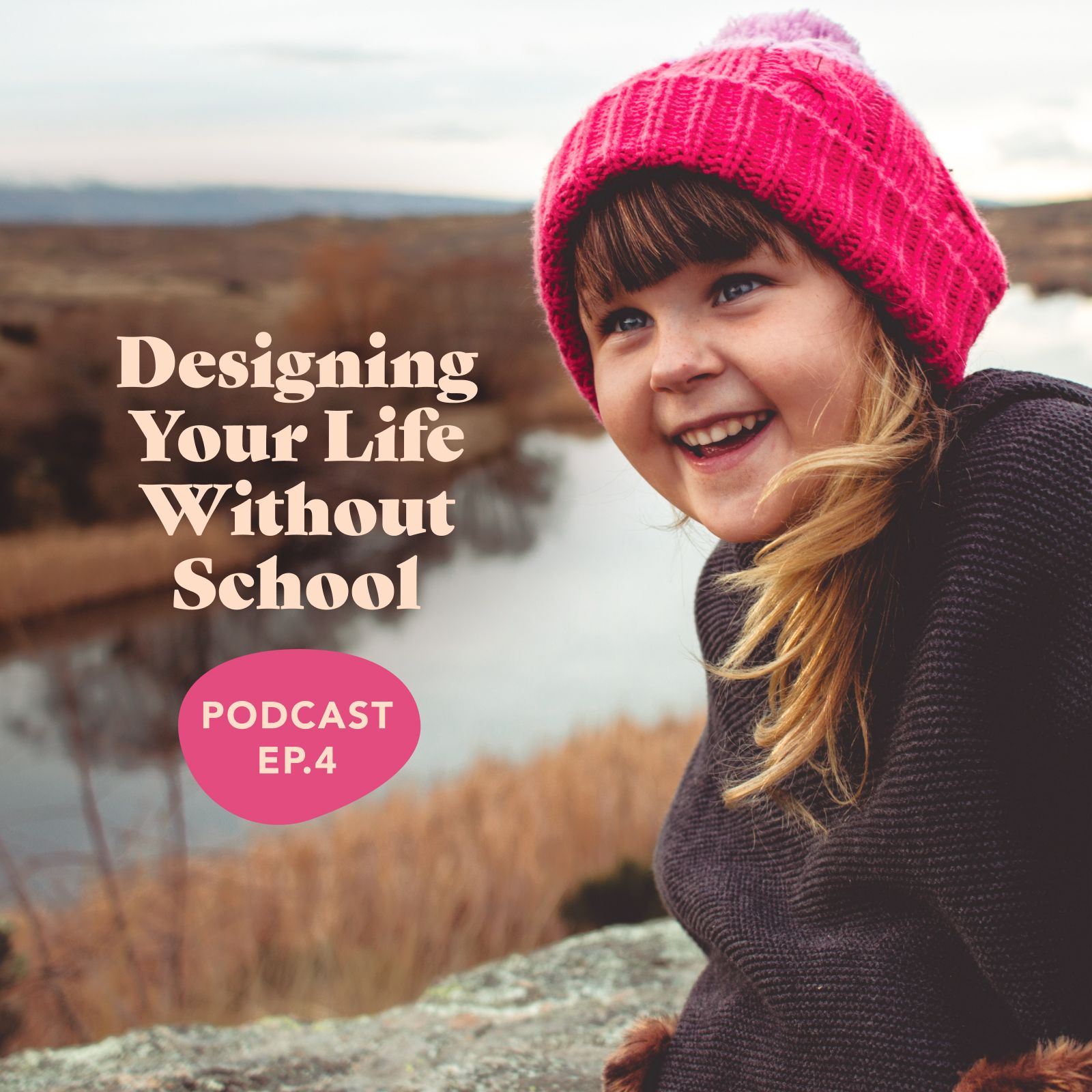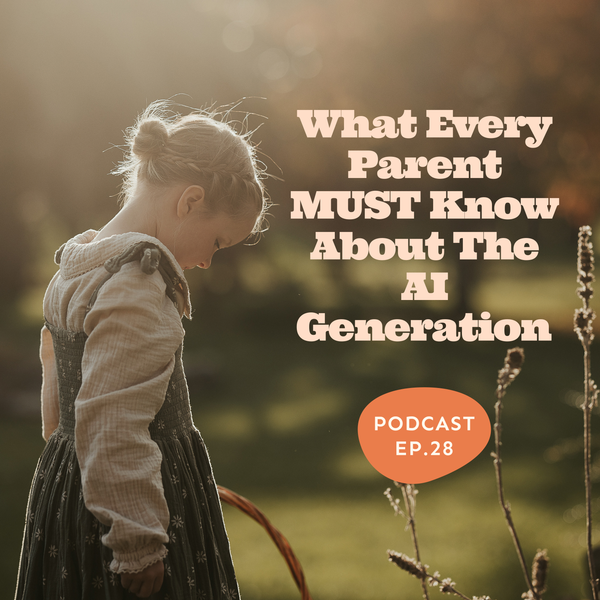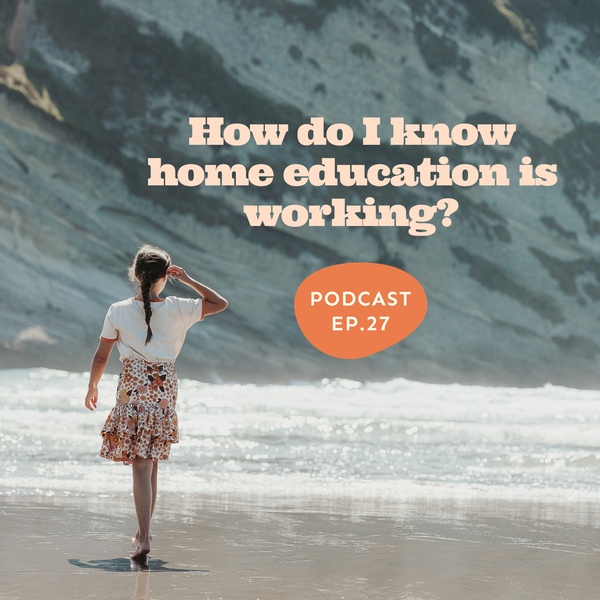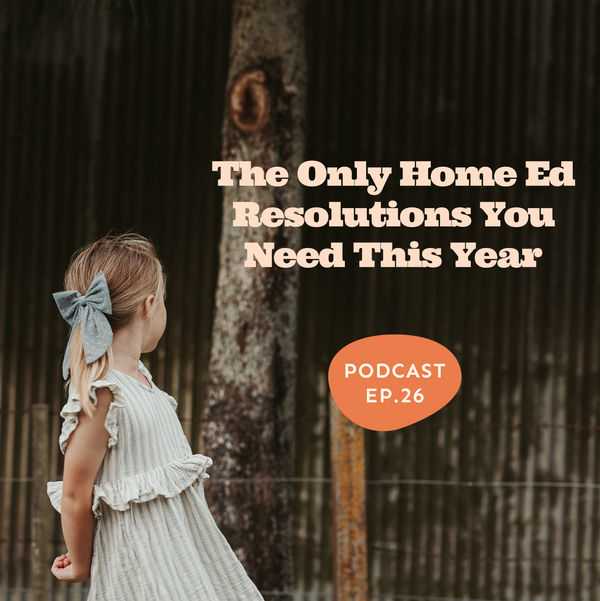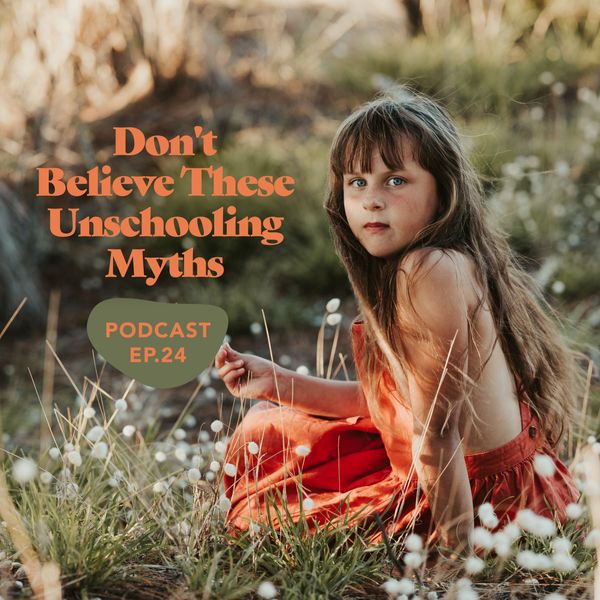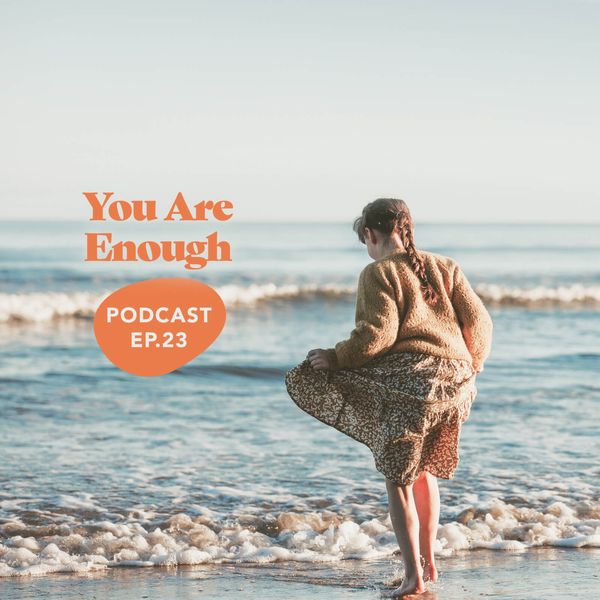In this week’s episode I want to talk about how a good home education lifestyle doesn’t just happen…it needs to be designed. Because it’s one thing to decide that a life without school is the right thing for your family, and the path you’re going to take…but it’s a whole other thing to work out, practically, what your days and weeks will actually look like.
The beauty of home education, of course, is that you get to decide how you want to approach it. But, that’s also one of its biggest challenges. And more often than not, you won’t find your balance and flow until you’ve experimented, and probably blended together a few different approaches.
You need to find what works for both you and your children, ebbing and flowing with your family’s energy and interests.
That’s not easy, it doesn’t just happen, and it takes some thoughtful work. Today, I want to help you with some starting points and strategies for that.
These private episodes go even deeper, backed by research, the science of how children learn and grow, and more than a decade of lived home educating experience. Each one is designed to help you rethink, reframe, and recalibrate the way you're walking this path, giving you the confidence to live the version of life you want. The Collection is 23 episodes strong and counting, with over 10 hours of listening available right now.
As a subscriber, you'll also get immediate access to my self-paced course, expert-led masterclasses recordings, five downloadable guides, our school exemption documents, and more 💛
Show Notes
My de-schooling guides: http://starkravingdadblog.com/home-schooling-guides/
Complete Transcript
Helloooo and welcome to the Life Without School podcast, here to help you and your children live the life you want to, not just the one you’re told you should.
I’m Issy, a writer and unschooling dad from New Zealand.
You can find more about me at starkravingdadblog.com, as well as collections of my favourite posts bundled up into supportive, encouraging little guidebooks for anyone walking this road less travelled.
Thank you so much for tuning in to listen today. Alright, let’s get into this week’s episode.
MUSIC
Hello again. I sent out my weekly email newsletter on Tuesday, and in it I talked about how many of the podcast reviews you’ve been sending in that have mentioned crying.
And how, at first, I was surprised by how many of you were saying you were getting teary about the stories I’ve been sharing. But the more of those sorts of messages I read, the more I realised it’s not at all surprising. School is a fast moving, one-way highway. If you’re able to keep up, everything will seem normal and fine. But if you can’t…you’ll feel like the whole world is leaving you behind. Like no matter what you do you can’t ever seem to get up to the right speed in the right lane.
There are a lot more broken down cars littering the sides of that highway than I ever imagined, and while that should never have been allowed to happen in the first place…it’s a powerful feeling knowing there are a bunch of us looking around at each other saying “Hey, should we climb over that barrier and walk over that rolling green hill instead?”
In this week’s episode I want to talk more about what that means, and can look like. How a good home education lifestyle doesn’t just happen…it needs to be designed. Because it’s one thing to decide that a life without school is the right thing for your family, and the path you’re going to take…but it’s a whole other thing to work out, practically, what your days and weeks will actually look like.
The beauty of home education, of course, is that you get to decide how you want to approach it. But, that’s also one of its biggest challenges. And more often than not, you won’t find your balance and flow until you’ve experimented, and probably blended together a few different approaches.
You need to find what works for both you and your children, ebbing and flowing with your family’s energy and interests.
That’s not easy, it doesn’t just happen, and it takes some thoughtful work. Today, I want to help you with some starting points and strategies for that.
This chat will include some of the more fluffy things I always like to talk about – because that emotional, head-space stuff is super important – but also some things that I hope you find tactical, and actionable. You might even want to jot down some notes, so grab a pen if you’re that way inclined.
OK, let’s dig into it:
MUSIC
Unless you and your children have already been on this path for a long time, or you grew up walking it and have never actually been to school yourself, there’s a very important process you’ll all go through before you start to really relax into things. This process…this work…is commonly referred to as ‘de-schooling’ – taking everything you know about education, which is probably grounded in the concept of school and systemised teaching and learning, and….re-learning everything. Wiping your mental slate as clean as possible, and coming at the whole idea of education – and, how children learn – as fresh as you can.
This…takes time. A general rule I’ve heard used is that it will take a child a month to detox from their schooling experience for every year they attended. If you’re taking a 10 year old out of school, and they’ve been there since they were five, you’re probably going to have a bumpy five or six months while they shake off that way of doing things. They will not wake up on the first day of their new home education journey ready to explore life in a whole new way. They will be stuck between paradigms, with some work to do to shake the old one.
I don’t know how scientific that concept of one year of school = one month of deschooling is, but it’s held pretty true for both of my two older kids. They spent a couple of years at school, and it definitely took us at least a couple of months to really start seeing differences in their approach to learning.
And then there’s you. How long did you spend in the school system? And what about the professional equivalent – a job that has the same level of structure, the same lack of autonomy? It’s hard to put a timeframe on how long it takes the average parent to de-school, but I can almost guarantee that you’ll still be wrestling with aspects of that old paradigm long after your child has shaken themselves free from it.
The key starting point is patience. With your child, yes, but mainly with yourself. You will not wake up tomorrow free of worry about this path you’re on. You’re likely to struggle with different things over and over again, some a lot more than others, so never forget that this will be a journey.
Now, I’m not going to tell you how to approach home education for your family, because…well…it’s your family. You will have your own unique life circumstances, and no one should be telling you exactly what your days should look like. Like I say – having that choice, that control, is one of the most powerful aspects of choosing a life without school.
But what I will do is give you a series of questions to ask yourself. Reflecting on how you feel about each one will help you start defining what the right kind of lifestyle is for your family. These questions will help steer you towards certain approaches to home education, that fit you and your children, and away from others, that don’t.
It will help you find your rhythm, your flow.
And as we go through this, please, please remember this one point – there is no right or wrong way to home educate.
MUSIC
Reflection Question One: What beliefs are you holding onto, that might hold your children back?
Remember – the beauty of home education is that you get to do things, more or less, your own way. There might be some boundaries you have to work within – your local education authority might require you to submit samples of work, or take annual tests, things like that – but in general, how you and your children approach education is up to you.
SO – with that in mind – make sure it is actually you deciding how you’ll go about things, rather than letting your experiences and what you think is expected of you lead the way.
Almost evvverything I’ve ever written has been about breaking that down. If you don’t come at your children’s education with fresh eyes, and a readiness to design your own lifestyle, you will default to the one you’ve had experience with. And for most of us, that means replicating – more or less – what happens at school. It means bringing the same pressures and expectations that exist in a classroom, into our home.
There’s a big bucket of things you should give some thought and research to. If you want them all in one handy bundle, check out the guides on my website – they’re effectively de-schooling handbooks, so I’ll link those in the show notes. If you haven’t actually started your home education journey yet, or you’re still in the early days of it, have a look at the Parent’s Guide To Choosing A Life Without School. If you’re already on the home education road, then the Homeschooling Parents Comfort Handbook is for you.
But right now, I want to pull out two of the biggest beliefs that I feel held me back early on, because I think they’re pretty common.
The first of those beliefs is that we know what all children should be taught.
The world has decided that literacy and mathematics are of primary importance. STEM disciplines, also, have risen (though, only recently, and slower than they should have). Below these subjects, we have the humanities – history, geography, and social studies. But other practical and physical areas of life – like art, drama, dance, music, design, physical education, communications, media studies, cooking, baking, sustainability, financial literacy and so much more…that’s all at the bottom of the pile. Not just in terms of the time we give to those things, but also – because of that – the inherent respect.
And so the hierarchy of importance is quite clear. It is set. It is as ingrained in our lives as the side of the road we drive on.
There are a bunch of reasons for why we’ve ended up with this hierarchy of importance, and there’s enough in there to dedicate a whole episode to that sometime. But for now, the point is that you don’t have to order your world in the same way. When you choose a life without school, you get to shake that up however you like.
Think about all those areas of life, think about what is important, and what might become important to you and your children. Think about what they’re good at, and what they want to become better at…and prioritise those.
The second belief is that we know when children should be taught.
Children begin school when they’re around five years old, and continue through to when they’re 17 or 18. It’s…how it’s done. It feels like that’s how it’s always been done. But it’s actually pretty recent. This…formalising…of the time children are spent being educated only came about as part of the Industrial Revolution in the 19th century. Again, going into why education suddenly became so structured is mostly another chat for another day. The point, for now, is that in terms of human history it’s actually a very recent thing.
Long story short, the original idea was to create – like a factory – as many of the same results from children, at the end of their schooling career, as possible. Let’s give everyone the same great education. It’s a well-intentioned idea. Not everyone believes its intentions were good, and they probably weren’t all positive, but let’s give it the benefit of the doubt. Because in theory, it’s wonderfully efficient. Every child on the planet goes through the same process and becomes educated to the same standard as everyone else. But industrial processes are very linear – things move through stages, in batches, towards an end result. It’s not a coincidence our education system feels like that – it happened alongside the development of industrial, mass-production techniques. It was by design. We have ‘batches’ of children entering a system based on their age, and we set about molding, shaping, and quality testing them as we move them towards an end result.
But systems like this don’t cope well with difference. They don’t cope well with breaks from the plan, from that one recipe. They don’t cope with human nature.
And they have no time to wait if something – or someone – can’t keep up with the pace their batch needs to move forward at.
Children of the same age are not children of the same stage. It is far too simplistic to boil human nature and mental development down to just age. It is convenient, for a system built on the factory model. In fact, it’s critical. But that doesn’t make it right. A child’s development is far more dynamic, and far more nuanced, than that. And if we force all that into age buckets, we will have the same result we do in a factory when a product that isn’t forming properly gets discovered on the assembly line – it will be set aside while the rest of the line moves on.
When you’re designing your home education lifestyle, don’t forget you’re allowed to walk right out those factory doors.
And when you do, you get to leave behind its idea of what children need to learn, by when.
So what do you think – are you holding those what children should learn, by when, beliefs tightly? Or can you shake them?
SHORT MUSIC
Ok, moving on to Reflection Question Two: How do your children engage with the world around them?
This is incredibly important to reflect on, because the answer to this will become the foundation for your whole approach to home education. If your child is highly energetic, expressing themselves through movement, noise, tinkering and testing, your days should look very different to someone who has a child that loves nothing more than to curl up with a book or draw and write at a table.
And, of course, then there’s the common dynamic of having both types of children under one roof.
Deciding on a formal homeschooling approach with a set curriculum and daily desk work might sound like a lovely, structured approach to life, but if you try and jam a tinkering, moving, highly active child into that paradigm you’re signing yourself up for a battle no one will ever win.
Making your days feel like you’re just blowing with the wind, adventuring from dawn to dusk, might sound romantic and lovely, but if you have a child who feels most secure in a homey routine that has a bit of structure and predictability to it…those adventures are just going to be stressful for everyone.
Think about your children and who they are. Think about yourself, and who you are. Not…how you want other people to perceive you. Not a version of you and your children that you think is expected of you.
But who you truly are. Who your children truly are. And what you all truly need.
The reality, usually, ends up being a bit of a mix of things. I’ll use our rough approach as an example for you:
In our home, for our family, we do very little of what you would call desk or study work. My eldest (14) is a writer and illustrator, so he does, but it doesn’t look like typical classroom study time. It looks like productive, passionate life work.
Our second (11) spends almost no time doing sit down study work, unless you call his piano a desk. In which case…he does hours of it. He also does a lot of cooking and baking (kitchen time is his second biggest interest), and then the rest of his time is made up of his version of play. Riding his bike, practicing karate, listening to music, tinkering with something mechanical, out in the garden…
Our third (6) is currently a full-time film-maker. She’s investing hours every day right now into iMovie on an iPad, crafting story lines, acting them out, and editing them into little movies. You might find her painting or drawing at a table, or out on her bike or the trampoline, but only for as long as it takes for inspiration to strike for her next film.
Our fourth (2) likes doing all of the above – especially if she can mix the painting, baking and piano activities together.
For us, we always try and remember that study time at a desk – like you see in a classroom – is only useful and relevant if…it’s useful and relevant. It’s hard to drop the academic pressure most of us have grown up living under, but just keep asking yourself – does your child actually need the things you’re asking them to learn right now? Are they engaged and interested because it serves a purpose for them? Or can whatever it is come later, when it has a direct line of meaning to something they want to learn more about, or go deeper into?
If they’re into it, great. But if that’s not how they want to engage with the world right now – try and find out what is.
SHORT MUSIC
Everything we’ve talked about so far now comes together into Reflection Question Three: What does your best possible day look like?
Really think about this, and get clear on it, because you can’t hit a goal without knowing what it is. It might happen accidentally, you might stumble on it, but that’s leaving life to chance.
Take luck out of the equation. What does your best day look like? What have your children experienced, or achieved, or learned more about, or succeeded at? Who have you all interacted with, and where? What feelings are you each taking to bed that night?
Ask yourself as many questions you need to define your ideal family day.
Then, before you go any further, remind yourself – you won’t hit that all the time. Life…just doesn’t work that way. Things will come up, someone will get sick, someone will wake up just not feeling it…there will be plenty of days that don’t hit that goal. BUT – if you set a foundation for what you’re trying to achieve as a family, you’ll have a pretty good shot at hitting those days more often than not.
Again, I’ll use our family as an example of what I mean.
Our eldest – Mr 14 – needs to complete a piece of work that he’s proud of each day. Usually that’s an illustration, but it could be a comic, or a Youtube video, or a short story…something that he has taken from his mind and turned into something real. It’s…what drives him. When he doesn’t have the time and space, at some point in the day, to dedicate himself to the creative process…he’ll feel frustrated.
Mr 11 is a bit the same – his creative process sits within music or baking, mostly – but the most important part of each day for him is physical. If he has to sit inside all day, doing mostly passive stuff, he goes crazy. He needs to move. And ideally, that’s something pretty significant – like a swim or a surf at the beach, or a proper walk into the hills with a pack on.
Ms 6 is actually a blend of her two older brothers. She’s a mix of wanting to create – right now, that’s those little films – and be physical.
And then there’s us, as parents. Because if we don’t take our needs into account, we’ll never be able to fully, and consistently, meet our children’s.
Kate, my wife, needs nature. She needs walks, and swims, and fresh air, and scenery. She needs to be active, and feel that nice glow of having done something physical. If she gets an element of that into her day, at some point, everything else slots into place.
I…need to write. I need to put my headphones on, tune everything else out, and take the words that are in my head and put them on my screen. But I also need physicality. I need to move, and swim, and run, and workout.
So, with all those needs identified, the flow of our days kind of writes itself. Our mornings are usually filled with creating – someone’s in the kitchen baking, a couple of us are at tables writing or drawing, there’ll be a stop motion film set operating somewhere…and then we usually hit nature. That’s weather-dependent, of course, but most afternoons we’ll be at a beach, or on a walking track, or at a swimming pool, or on our bikes…we all thrive when we get to create, and then use our bodies.
It’s…a pretty simple formula. But what matters is it’s ours.
And that’s really the point here. I think, too often, we overcomplicate home education. We have all these layers, and all these expectations, and all these pressures, and all these beliefs…and it doesn’t have to be that hard. It doesn’t have to be that complicated.
Strip it all back. Right back to just you, and your children.
MUSIC
I want to wrap this up today by repeating, again, that the home education lifestyle you live will only fit your family well if you design it to. By default, you will do things that you think you should. That’s ok. That’s completely natural. But for the sake of your children, it’s so, so important to understand that those beliefs you’re carrying into your home education journey are ingrained not because they’re right, and best…but because they’re just how things have been done.
How much, or how little of that you choose to keep is up to you. I can’t encourage you enough to sit down and reflect on who you are, who your children are, and what you’re all trying to get out of life. Start with that. Build a foundation that is intentionally yours. And from there, you can start adding layers that are useful, and relevant, and necessary.
But also remember that this work is hard. It will not come easily. Most of us, as adults, have spent our lives in a very set educational paradigm. Re-writing that is not trivial. It will take effort, and it will take time.
Give yourself, and your children, the grace you need to process it all. Remember – you’re re-writing history, here.
Thank you, again, for being here with me this week, and – as always – if this podcast has touched your day please leave a review on whatever platform you’ve listened to it on. It really does help make it more visible, and to reach more people.
Ok, I’ll see you back here soon.
Bye for now.


